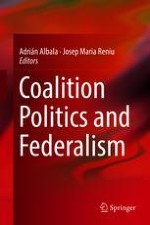2018 | OriginalPaper | Buchkapitel
Presidential and Subnational Elections: The Logic of Party Alignments in Brazil (1994–2010)
verfasst von : Vítor Eduardo Veras de Sandes-Freitas, Fernando Augusto Bizzarro-Neto
Erschienen in: Coalition Politics and Federalism
Aktivieren Sie unsere intelligente Suche, um passende Fachinhalte oder Patente zu finden.
Wählen Sie Textabschnitte aus um mit Künstlicher Intelligenz passenden Patente zu finden. powered by
Markieren Sie Textabschnitte, um KI-gestützt weitere passende Inhalte zu finden. powered by
